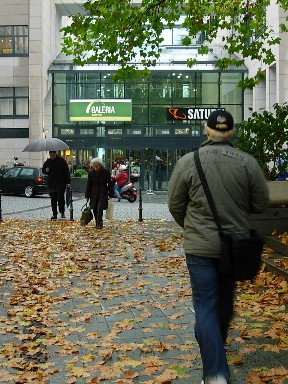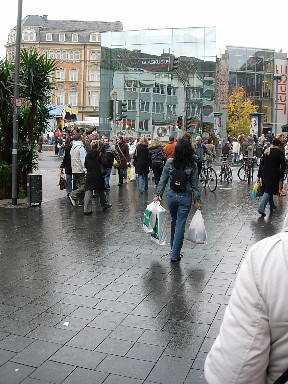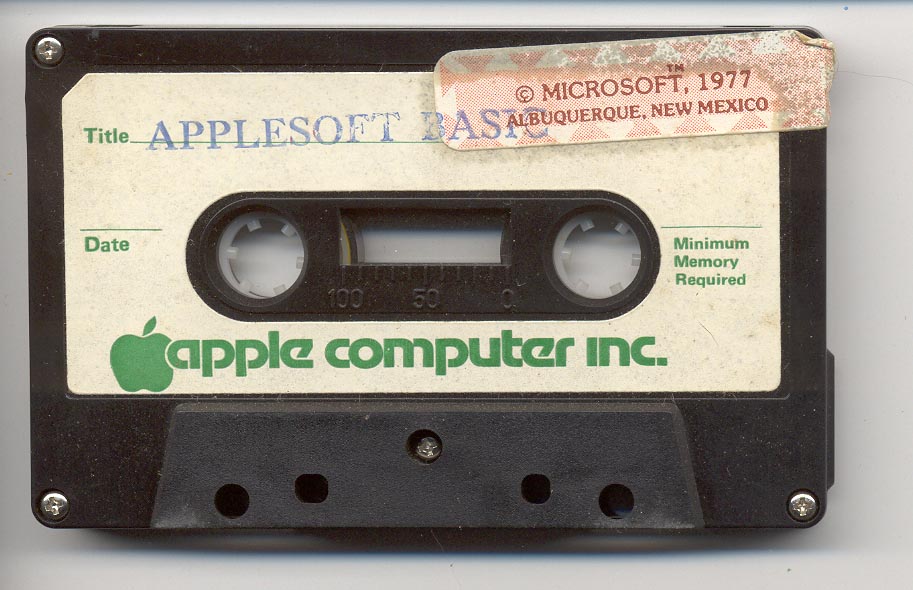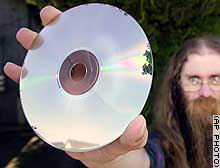Geek Guide to Aachen.
Nov 12Oh glorious days between friday and monday. Days we look forward to, days we enjoy, and days we mourn when monday comes and takes them away. So this weekend was a little different. Belgium celebrated 'Truce Day' where we remember the end of the first world war in 1918. Suffice the fact that the weather sucked, on saturday Belgium was drenched in autumn rain and devote of any economical activity, cause all the shops where closed. So we skipped the border and went for a little daytrip to Aachen.
One of the nice things of living in the nook of the country is that one is very very close to the "aussland" as we could say. 30 km's is the distance that devides us from one of the major Dutch cities of Maastricht, and a small 80 kilometers seperate us from the German city of Aachen. So we pop over regularly. Aachen USED to be the one stop shop place for all my hardware needs. Back in those days the VAT in Germany on computer parts was a only 16% (as opposed to 21% in .Be) and they had some excellent cash-and-carry computer shops to get ones hardware. So we used to order on line, take the car at 9am in the morning , drive to Aachen , arrive at 10, pick and pay our order and be back before dinner. (actually we had dinner in Vaals, in holland, before we came back home) What was nice was the whole international flavor, carrying three kinds of currency and having to speak Dutch, German and occasionally some French before the Saturday afternoon had started.
But these days things are different. The VAT in Germany went up , making it no longer interesting to buy computerparts, OEM systems are soooo cheap it isn't worth the while and of course the Euro has chased away the Gulden and the Demark. But i'm going to give you a little overview of where we went , so if you ever feel like going .. you know where to go.
 When going to the city of aachen. The best place to park is probably beneath the Media Markett in the town centre. It offers safe and cheap underground parking ,but the cool stuff is , the general multimedia geek-out-paradise is right above you. So no need to "shlepp" around that 50" plasma cross town.
When going to the city of aachen. The best place to park is probably beneath the Media Markett in the town centre. It offers safe and cheap underground parking ,but the cool stuff is , the general multimedia geek-out-paradise is right above you. So no need to "shlepp" around that 50" plasma cross town.
 If you exit the parking lott , go to the main "AlexanderGraben" and turn right to stroll down to the center of the town. By then you have probably gotten hungry you can endulge yourself in BratWurst and stuff , but for us a great place to eat is the LOUISIANNA. This very American restaurant offers great ribs, chicken wings , all in a southern flavour. Downright excellent food. But the shop is strategically placed between 2 major points of interests for geeks like us.
If you exit the parking lott , go to the main "AlexanderGraben" and turn right to stroll down to the center of the town. By then you have probably gotten hungry you can endulge yourself in BratWurst and stuff , but for us a great place to eat is the LOUISIANNA. This very American restaurant offers great ribs, chicken wings , all in a southern flavour. Downright excellent food. But the shop is strategically placed between 2 major points of interests for geeks like us.
 At the entrance of the gallery there is the DATEC computer shop . A very small shop that sports a wide aray of hardware, but is very well known for the MIRAI screens they sell. Getting ones hands on one of their wopping widescreen displays (1440*900 resolution) for 257 Dollars US is a bargain. I personally have bought two over the last two months and absolutely LOVE Them. Looking at an apple cinema display (20" widescreen) for more then double the price, its not worth the hassle.
At the entrance of the gallery there is the DATEC computer shop . A very small shop that sports a wide aray of hardware, but is very well known for the MIRAI screens they sell. Getting ones hands on one of their wopping widescreen displays (1440*900 resolution) for 257 Dollars US is a bargain. I personally have bought two over the last two months and absolutely LOVE Them. Looking at an apple cinema display (20" widescreen) for more then double the price, its not worth the hassle.

But at the end of the gallery, you walk straight into the SATURN MEDIA STORE . When it comes to getting a cheap bargain and a lot of hardware, software, dvd's, music and what have you to browse through , this is sheer heaven. When going shopping for your geeky gear, be sure to COMPARE the prices from the Media Market and the Saturn shop. These two shops are regularly at each others throats and that results in getting a price difference of 80 euro's or more , just by strolling through town.

And of course, no geek is complete without his dose of coffee. 2 excellent locations pop to mind. First of all , the spectacular "Glass Cubus" A coffeehouse on the top of Aachens major shopping street. Sporting a wide variety of coffee's and Java's its a bit on the pricy side, but worth the while. Where it only to be sitting inside , watch the world go by and having the comforting thought that nobody can look IN. (but be careful not to walk past it just like that. As you can see on the picture .. it can appear quite invisible.) There is also a Vodaphone shop inside the building, you'll find directions on their site
But if you are into American Coffee , be sure to walk up to the town square and (walk by the LUST FOR LIFE store ) and visit the local Starbucks . Since we don't have one of those here and we are big big Java sluts, you can mostly find the Knights perched up behind one fracking big cappuccino to round up the day. Mac
So next time you go over to the German side of the border, you might be interested in our little tourist tour. For all I know , we surely had a swell day. 🙂
Related Posts
The coming of Cyber archaeologists.
Nov 03Will we need cyber archaeologists.
 Looking at it, its the oddesd of things. This flimsy plastic box with two round holes in it, seems to come from another age. A brown warn little plastic tape worms itsself from one side of the container to the other. Only 20 some years old , the cassette is as obsolete as the dinosaurs. Yet a few weeks ago my dear aunt called me up in a panic, telling the tale how the evil old cassette player she had owned for so many years had 'eaten' a cassete with a recording on it of my late grandmother singing. I of course offered to go ahead and fix it. After half an hour of poking and prodding with a pair of tweezers and some sticky tape I managed to get the cassette back together. Now I just had to find a cassette player to play it on… It was at that moment i realised .. I did not have one anymore. The thought propped up to me that we store so much information these days on so many carriers, but yet all these media are futile and soon we won't be able to recover anything we stored 10 years ago because technology moves so fast. Will we need cyber archeologists in the future ?
Looking at it, its the oddesd of things. This flimsy plastic box with two round holes in it, seems to come from another age. A brown warn little plastic tape worms itsself from one side of the container to the other. Only 20 some years old , the cassette is as obsolete as the dinosaurs. Yet a few weeks ago my dear aunt called me up in a panic, telling the tale how the evil old cassette player she had owned for so many years had 'eaten' a cassete with a recording on it of my late grandmother singing. I of course offered to go ahead and fix it. After half an hour of poking and prodding with a pair of tweezers and some sticky tape I managed to get the cassette back together. Now I just had to find a cassette player to play it on… It was at that moment i realised .. I did not have one anymore. The thought propped up to me that we store so much information these days on so many carriers, but yet all these media are futile and soon we won't be able to recover anything we stored 10 years ago because technology moves so fast. Will we need cyber archeologists in the future ?
Media are futile.
 There are few media that survive the test of time. Even paper turns to dust after so many hundred years, depending on how it is stored. And so are the media we store stuff on today. The average lifespan of a cassette tape, a cd-recordable, a dat tape or even a floppy disk does not even come close to the lifespan of paper. Yet while a single peace of paper can hold out for a hundred years, a DVD rom with all the collected works of Plato won't last a hundred years at all. The loss off information that can occur when our media turn sour is only multiplied by the enormous amounts of data they can carry. To loose a single sheet of paper over the course of a thousand years might be a loss, To loose a thousand documents on a single cd-rom after 10 years is even worse. So what is there to do but to transfer information from medium to medium in order to let it stand the test of time ? Or what if we find the carrier that will last us to infinity.. What format must we use to write our data ?
There are few media that survive the test of time. Even paper turns to dust after so many hundred years, depending on how it is stored. And so are the media we store stuff on today. The average lifespan of a cassette tape, a cd-recordable, a dat tape or even a floppy disk does not even come close to the lifespan of paper. Yet while a single peace of paper can hold out for a hundred years, a DVD rom with all the collected works of Plato won't last a hundred years at all. The loss off information that can occur when our media turn sour is only multiplied by the enormous amounts of data they can carry. To loose a single sheet of paper over the course of a thousand years might be a loss, To loose a thousand documents on a single cd-rom after 10 years is even worse. So what is there to do but to transfer information from medium to medium in order to let it stand the test of time ? Or what if we find the carrier that will last us to infinity.. What format must we use to write our data ?
Formats are fleeting
If your average DLT tape will turn brittle and break in a hundred years you might just have been lucky. Think not of the medium the information is written on , think of the format the information is stored in. Format types like .doc , .xls and so on are even more fleeting then their carriers. You can make your programs backward compatible into the extreme , supporting exotic fileformats of days long gone is a painfull task. Some, like .html, .txt .pdf and .rdf, might be supported for years to come, but what about other, exotic and propriatary standards, formats of backup programs and so on. One might hold a treasured box of data in ones hand but if the fileformat is no longer supported .. How can we ever access it ? Perhaps we will find the key to the format .. but what about the system it was written for ?
Systems are fleeting
 It can be even worse. Say we have salvaged the medium and have somewhere found the original application to read it with. What if it only runs on specific hardware ? An evolution that is even faster then the formats and the media , must be the hardware ! What if the information we need only runs on some ancient system like say for example a commodore 64 ? Where to find one ? and even more importantly : where to find the parts if something breaks. Even to this day some "legacy' programs that are still being used in production, run on hardware that is no longer supported by the manufacturer. So what do we have to do ? Store both the information, the media, the original application AND the hardware it runs on in our archives ? What can be so important that we need to go through all this hassle ?
It can be even worse. Say we have salvaged the medium and have somewhere found the original application to read it with. What if it only runs on specific hardware ? An evolution that is even faster then the formats and the media , must be the hardware ! What if the information we need only runs on some ancient system like say for example a commodore 64 ? Where to find one ? and even more importantly : where to find the parts if something breaks. Even to this day some "legacy' programs that are still being used in production, run on hardware that is no longer supported by the manufacturer. So what do we have to do ? Store both the information, the media, the original application AND the hardware it runs on in our archives ? What can be so important that we need to go through all this hassle ?
what is important
"So what .." I hear you say ? What if we loose that excell file thats 8 years old ? Who cares ? … But that is just it. We might know what information is important today, but we will never be able to tell what information is pivotal or trivial in the future. The first posting by Linus Torvalds on usenet might have been unimportant, Yett only history will tell wether this one event might be something for the historybooks. The fact is we store more and more information these days on systems, media and in formats that might not stand the test of time. Wether or not something will be important in the future is impossible to tell at this time, thus we risk turning the digital era we live in today, into tomorrows informational dark ages , from which nothing will be remembered in the future.
Cyber archaeologists
 I see a new profession emerging. Perhaps starting out as a niche market, later to evolve in something that will turn into an exact science. People who spend their time looking through old digital archives. Who have the skills to work with old legacy hardware, know which side is up on a floppy disk , and God forbid, even speak the language of the old commodore 64. Cyber-archeologists digging through our digital past, being able to unlock and uncover the secrets of the past and bring them back in the light of whatever modern civilisation there might be. A proffesion that holds both the keys to FINDING information and being able to ACCESS it aswell. A trait of archeologists not speaking of the jurrasic but of the "basic" or the "x86" period of the past …
I see a new profession emerging. Perhaps starting out as a niche market, later to evolve in something that will turn into an exact science. People who spend their time looking through old digital archives. Who have the skills to work with old legacy hardware, know which side is up on a floppy disk , and God forbid, even speak the language of the old commodore 64. Cyber-archeologists digging through our digital past, being able to unlock and uncover the secrets of the past and bring them back in the light of whatever modern civilisation there might be. A proffesion that holds both the keys to FINDING information and being able to ACCESS it aswell. A trait of archeologists not speaking of the jurrasic but of the "basic" or the "x86" period of the past …
Epîlogue
As evolution speeds up .. so does the regression of the past into oblivion.
I for one do think we will have them in the future. Experts in finding what was stored but yet was lost. Keepers of keys that can unlock the files from our past and bring them back. With the amount of information we produce, the digital legacy we leave behind… its unthinkable that these things would be lost forever in a period of only a few decenia. Prove me wrong .. Digg into your past and find the first digital document you ever made ? Perhaps you"ll need a cyber-archaeologists to complete the task.





